Hello Junkies!
How are… you? This is a very important question and is used every day in all conversations around the world. In fact, it can also be considered a way to say hello in Japanese.
So in this lesson you will learn the 22 Ways to ask How Are You in Japanese.
Ready? Let’s go.
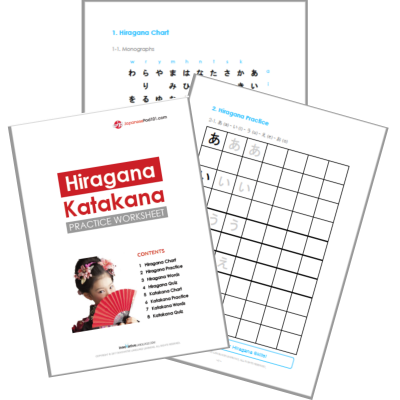 | Want to learn how to write in Japanese? Download your FREE Japanese Alphabet eBook here. |
1. お元気ですか?
Asking about their “genki-ness” – How are you?
This is #1 most common way to way to ask how someone is in Japanese. You’ll read this in every textbook and hear this in every lesson. Genki simply means “lively” or “healthy.”Here’s the polite version to use for strangers and older people.
- O Genki desu ka?
- お元気ですか?
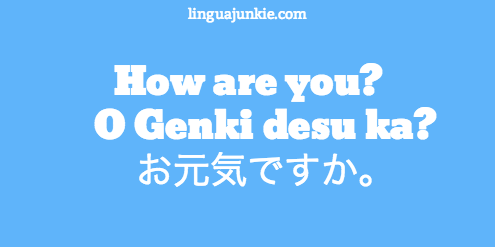
By the way, you should also hear real Japanese and its sounds.
So, if you’re interested, here’s a quick lesson greetings from JapanesePod101.
- Japanese Lesson – Where Are You From?
- Click here to get more fun Japanese lessons at JapanesePod101.
2. 元気?
Here’s the casual way to use with friends. All you have to do is say this with a question tone.
- Genki?
- 元気?
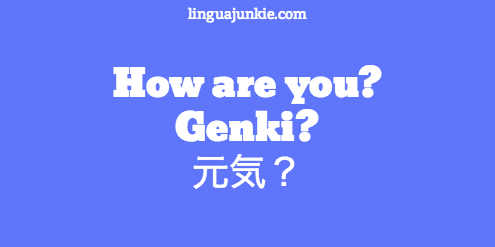
3. 元気だった?
Another variation is… Have you been well? The difference here is that this is in the past tense. You want to know how they’ve been.
- Genki datta?
- 元気だった?
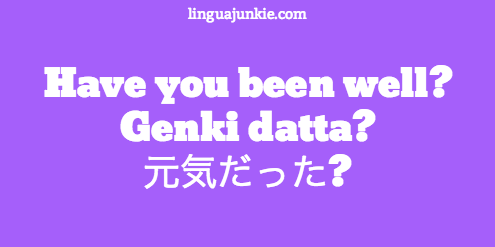
4. 最近はどうですか? How are you recently?
This is another way to ask about them. In this case, you want to know how they are recently. Note, if you noticed above, keep the “desu ka” and it’s polite. Remove the “desu ka” and it’s casual.
- Saikin wa dou desu ka?
- 最近はどうですか?
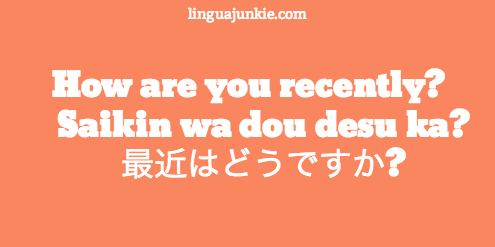
5. 最近どう?
And here’s the casual way. You can also say “sakin wa dou” but “wa” can get dropped. Casual is all about dropping words.
- Saikin dou?
- 最近どう?
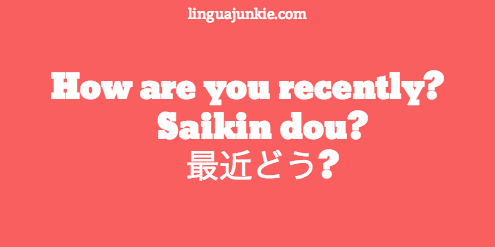 Or even more casual, here are some other variants of “How are you” in Japanese.6. Dou yo?How’s it going?Super casual. Yo is added for extra enthusiasm.
Or even more casual, here are some other variants of “How are you” in Japanese.6. Dou yo?How’s it going?Super casual. Yo is added for extra enthusiasm.
- Dou yo?
- どうよ?
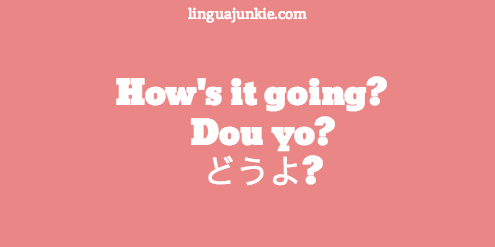
7. 気分はどうですか? How do you feel?
Kibun means mood or feeling. So this question literally asks how your mood or feelings are. This is more about health and well-being (physical or emotional), rather than just asking “how are things?”
- Kibun wa dou desu ka?
- 気分はどうですか?
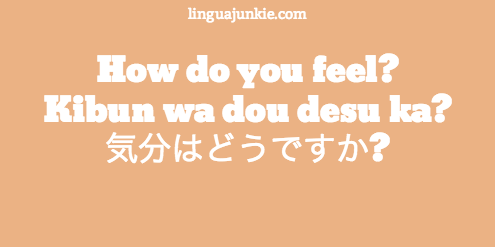
8. 気分どう?
And more casually…
- Kibun dou?
- 気分どう?
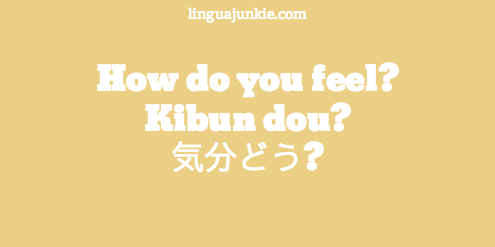
9. 調子はどうですか? How’s it going?
Choushi means condition. You can only ask this when there’s implied context or some understood situation. For example, if your friend is sick… and you ask him that, you’re referring to his sickness. If your friend is busy at work, this means you want to know about things going on with his work situation.
- Choushi wa dou desu ka?
- 調子はどうですか?
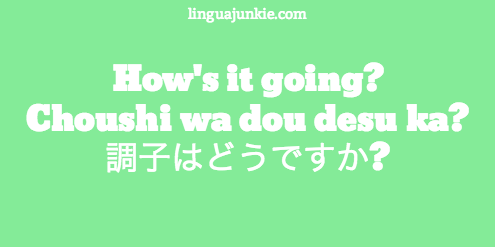
10. 調子はどう?
And more casually…
- Choushi wa dou?
- 調子はどう?
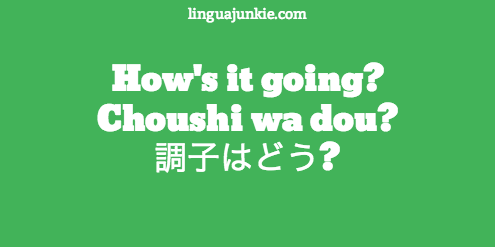
11. どうしたんですか?What’s wrong?
Another good way to say how are you in Japanese. And yes, this should be used in negative situations when you think something is wrong.
- どうしたんですか?
- Dou shitan desu ka?
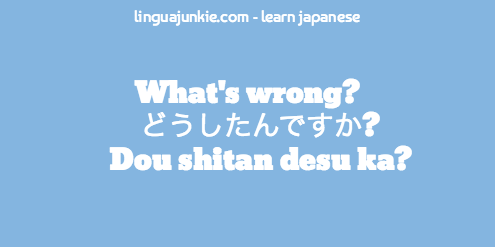
12. どうしたの?
And more casually (you can even drop the “no”).
- どうしたの?
- Dou shita no?
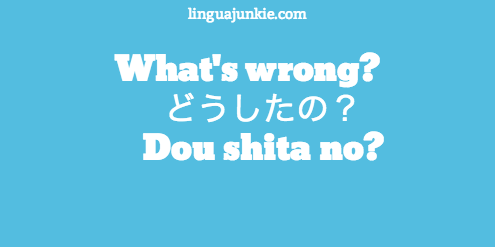
13. 何事だ?What’s goin’ on?
Super casual. When you just want to find out what things have been going on.
- Nani koto da?
- 何事だ?
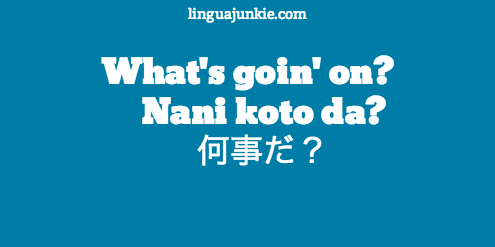
14. 今なにしてるの?What are you up to right now?
Very common question among friends. Although it’s not an obvious “how are you,” it’s another variation of find out what’s going on with your friend.
- Ima nani shiteruno?
- 今なにしてるの?

15. 私はただあなたの本当の気持ちが知りたいだけだよ。All I want is to know how you really feel.
Now this is a pretty serious way to ask “how are you.” Most people aren’t direct. Ask them directly how they feel. But this is too direct of a phrase for Japanese natives to use, so keep that in mind.
- Watashi tada anata no hontou no kimochi ga shiritai dake dayo.
- 私はただあなたの本当の気持ちが知りたいだけだよ。
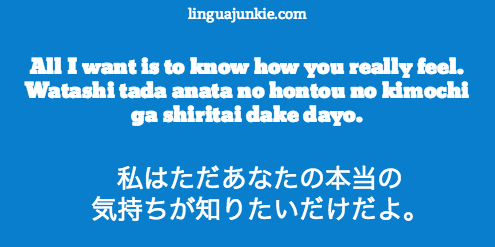
16. How have you been? (Long time no see!)
Technically, hisashiburi means “long time no see.” However, it can be interpreted as “how’ve you been?” Use it when you haven’t seen someone in a while!
- Hisashiburi!
- 久しぶり!
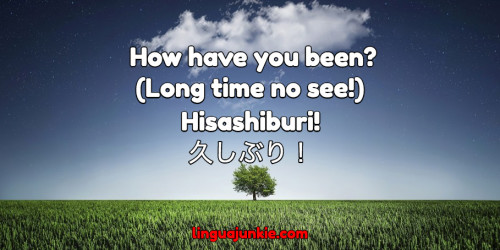
17. 心の声を聞かせて。Tell me how you really feel.
If translated literally, it’s “tell me your heart’s voice.” However, you should know that you can’t be literally translating stuff – you’re not capturing the intended meaning.
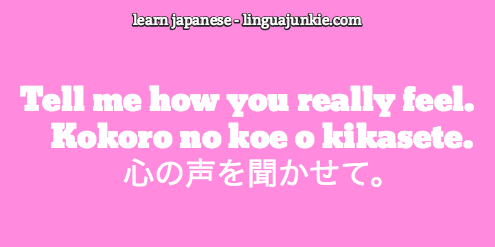
18. なんか面白いことあった?Anything interesting?
This is super casual. It’s like asking “what’s the good news” or “anything good happen lately? It’s a way to dig for positive news in Japanese.
- Nanka omoshiro koto atta?
- なんか面白いことあった?
 19. 最近なにしていますか? How are things going recently? What are you doing recently?
19. 最近なにしていますか? How are things going recently? What are you doing recently?
Here, you’re simply asking what they’ve been doing (shite-imasu) recently (saikin). Just another variation of things you’ve learned before.
- Saikin nani shite-imasuka?
- 最近なにしていますか?
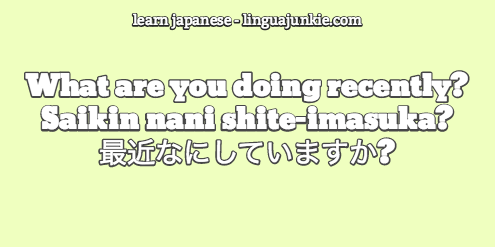
20. 元気かい? Hey, whats up? How are ya?
This is super colloquial and casual. You’ll see “kai” which is the colloquial for “desu ka.” Do NOT use it this outside of friends.
- Genki kai?
- 元気かい?

21. どうだい?How’s things? How’s it going?
Again, super casual and worthy of it’s own entry. You know “dou” but “dai?” “Dai” is a colloquial version for “dayo.” Again, don’t use this outside of your friends.
- Dou dai?
- どうだい?

22. 最近なんか変わったことある?Anything change/anything new recently?
Here, you’re asking if there’s any thing (koto) that has been changed (kawatta).
- Saikin nanka kawatta koto aru?
- 最近なんか変わったことある?
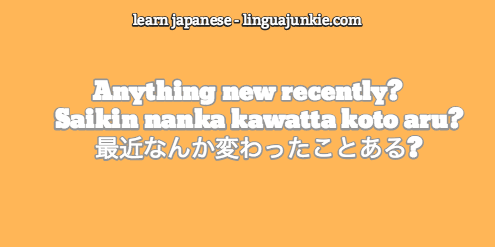
Conclusion
And that’s it!You’re done.Do you know of any other ways to ask how are you in Japanese? Please leave a comment below. I read all comments and I will add your suggestions to this list! Let’s make it a big one.Feel free to share or print this article for your own review!
The Main Junkie
!P.S. I highly recommend this – if you REALLY want to learn to Japanese with effective lessons by real teachers – Sign up for free at JapanesePod101 (click here) and start learning
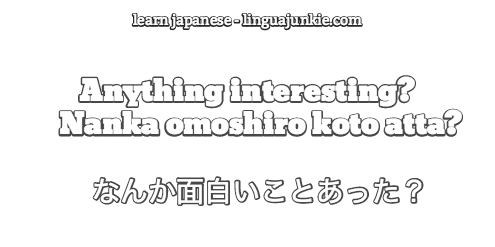 19. 最近なにしていますか? How are things going recently? What are you doing recently?
19. 最近なにしていますか? How are things going recently? What are you doing recently?
this was my thing*
Muito bem escrito!
[…] and stop saying things the same way every time. For example, there’s an article about 22 awesome ways to say how are you in Japanese, and one for 22 ways to say I agree in Japanese. I definitely recommend these, and there are plenty […]
Konichura
Apologies this is quite long…
This is a really random/seemingly odd question but I want to write to my uncle in Japan (he’s English but fluent in Japanese and highly educated) and ask how he and the family are doing (his wife and kids are born an raised in Japan)
I’m not sure how to ask/how polite I have to be haha I don’t want to come across offensive or rude… :-/ but even though he’s almost twice my age (in his 40’s) when we meet we jus say ‘sup’ This is so confusing
日本では通常の会話で誰かと会う時「元気ですか?」等の挨拶は言いません。「おはようございます」、「こんにちは」、「こんばんは」のみです。
あと「何事だ?」の読みは「なにごとだ?」です。
In Japan,there is no culture to say “how are you” in usual conversion.there are only “good morning”, “good afternoon” “Hello”, “good evening”.
And how to read “何事だ?” is “nanigotoda?”,
I’m a beginner but using Japanese Pod 101’s Podcasts I learnt, Daijoubu des ka? Literally, are you fine? with the response simply as Daijoubu 🙂
because it didn’t sound “right” I looked up Hisahiburi —you have probably already heard this but the romaji is wrong. I can be confusing for beginners like myself. The word with kanji below is fine ( I am assuming I can’t read many kanji yet) and there is a shi there but not in the word above. Just thought I would let you know,